General
Chancellor Shares Vision for Makerere University during His First Graduation Ceremony
Published
1 year agoon
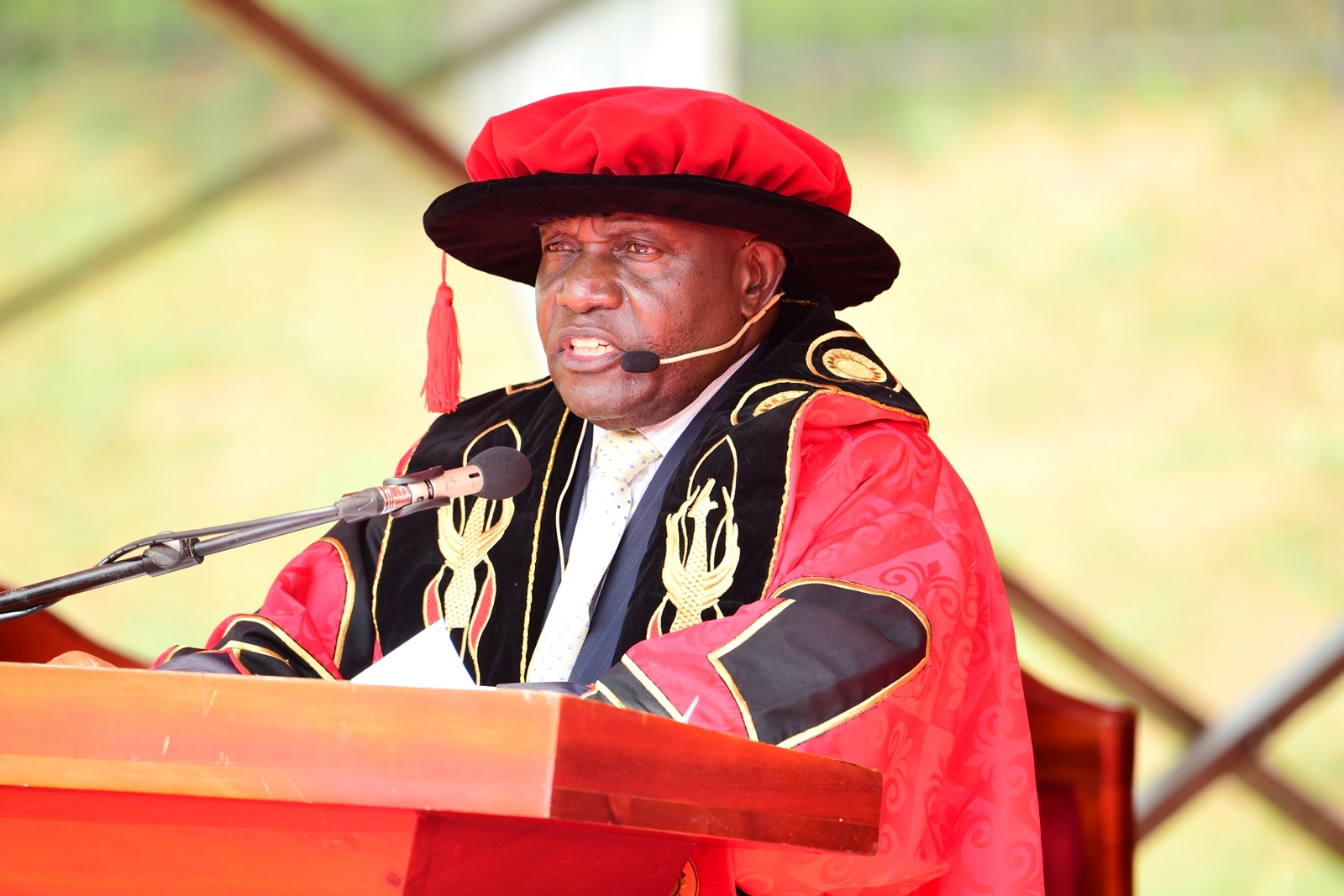
Hon. Dr. Crispus Kiyonga, the newly appointed Chancellor of Makerere University, has laid out his vision for the institution during the 75th graduation ceremony.
Installed by President Yoweri Kaguta Museveni as the Chancellor of Makerere University on 2nd October 2024, the 75th occasion marks his maiden graduation ceremony as the titular head of this great institution.
A total of 13,658 graduands will receive degrees and diplomas during the 75th graduation ceremony (13th to 17th January 2025).
On the first day of the 75th Graduation ceremony, the following colleges presented students for conferment of degrees and award of diplomas: College of Education and External Studies, College of Computing and Information Sciences, College of Veterinary Medicine, Animal Resources and Bio-security and the School of Law.
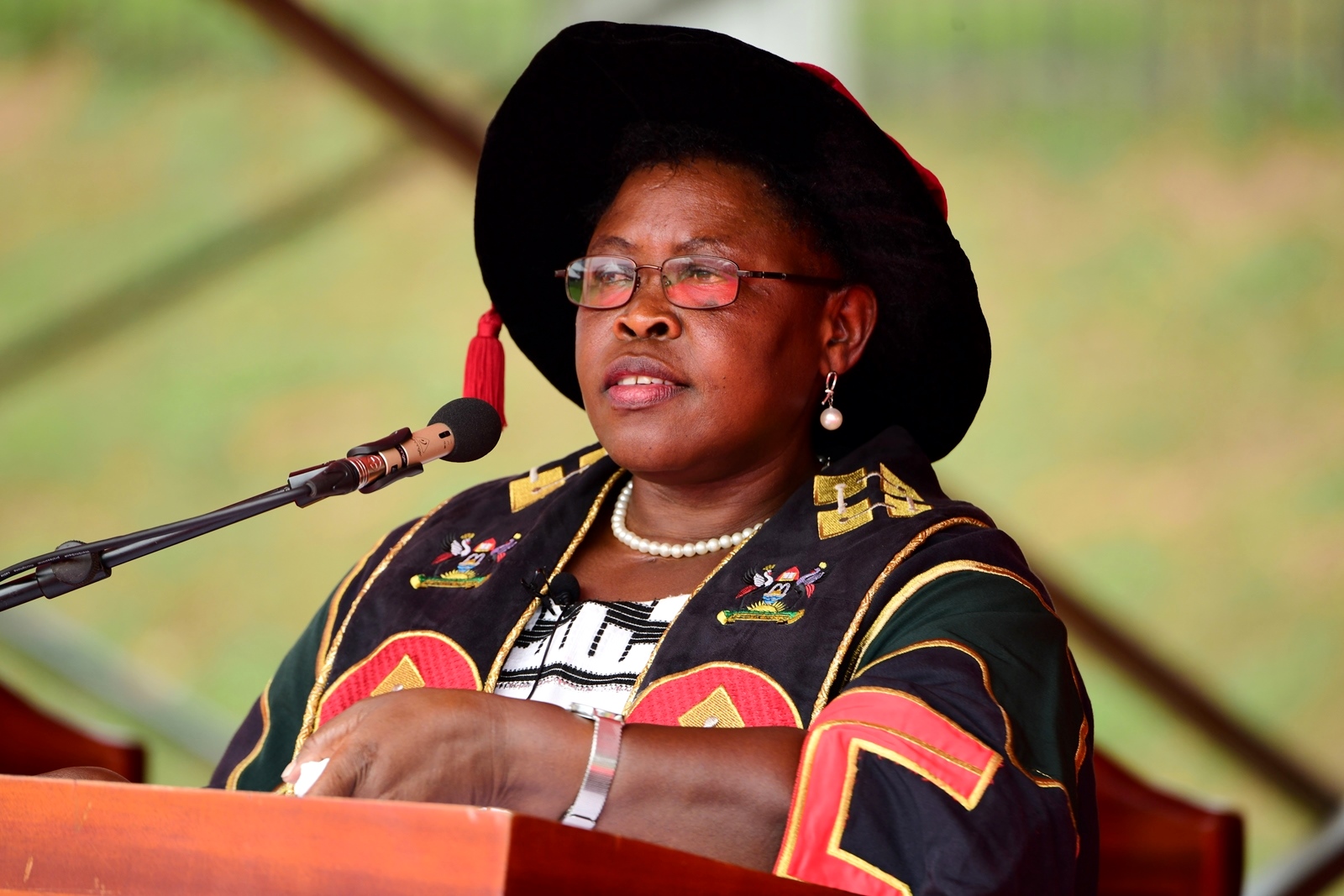
The Guest of Honour, Hon. Janet. K. Museveni, First Lady and Minister of Education and Sports represented by Hon. Dr. Joyce Moriku Kaducu, Minister of State for Primary Education congratulated the congregation upon attaining this major milestone.
“On my own behalf and on behalf of the Ministry of Education and Sports, I am grateful to the University Council, Senate, Management and all staff for their unwavering commitment towards preparing our students who have duly completed the requirements leading to the award of the academic qualifications they are receiving today” she said.
The Minister equally congratulated the University Management for ensuring that transcripts for all students graduating are ready for collection from their respective colleges, and urged the graduands to embrace the spirit of hard work and the desire to make the world a better place.
“I have no doubt that you will face the future with courage, creativity and conviction. There are plenty of opportunities out there, take advantage of the many opportunities to create jobs,” encouraged the First Lady and Honourable Minister of Education and Sports.

Furthermore, she commended the Students Guild for cultivating a cordial working relationship with the University Management and ensuring that matters affecting to students welfare in the University are handled amicably.
In his address, Hon. Dr. Kiyonga outlined several key areas that he aims to focus on as he steers the university forward. A proud alumnus of Makerere, Dr. Kiyonga reflected on the transformative power of education, emphasizing that Makerere’s role in national progress must extend beyond teaching to include research, industry collaboration, and community engagement.
Dr. Kiyonga revealed that enhancing the university’s research capacity is one of his primary goals. He praised the government’s allocation of UGX 30 billion to the Makerere University Research and Innovations Fund (Mak-RIF), recognizing the importance of research in driving Uganda’s socio-economic growth.
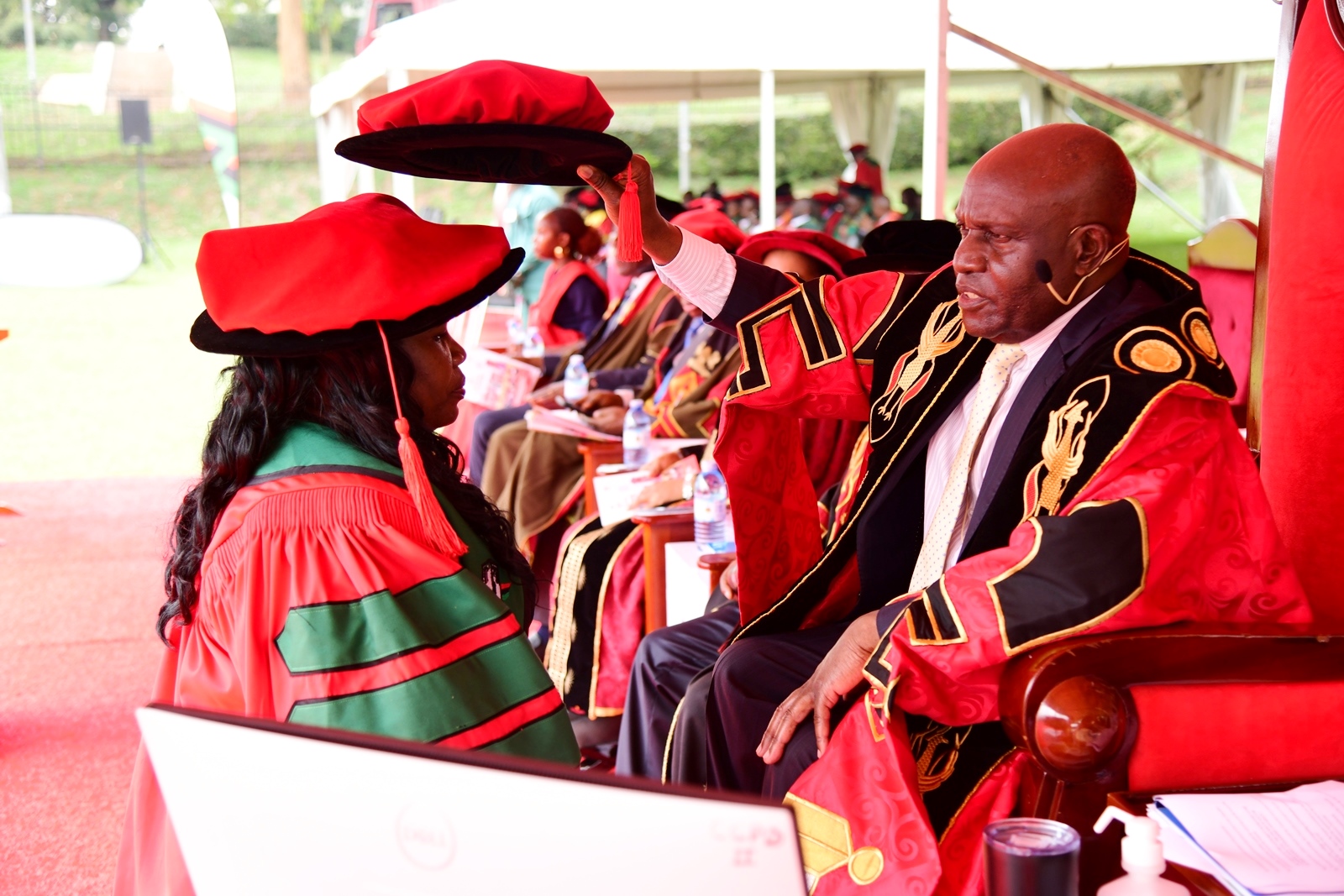
“Makerere University is the oldest university in the country. Over the years the institution has built a strong stock of high quality human resources. The University is doing significant amount of research,” he said.
He noted that there is need for further support, saying, “More work is required to mobilize for an increment of funds in order to further support research work.”
He also emphasized that Makerere should play a leading role in generating knowledge to address pressing national challenges. “Research plays a very vital role in the development of any community,” he said, underscoring the importance of transforming research into actionable solutions.
In addition to research, Dr. Kiyonga highlighted the need forMakerere University to build stronger connections with both national and international industries. “We are generating innovations that should eventually be taken to the commercialization level,” he remarked. He proposed the creation of agro-industrial parks on land allocated by President Museveni, which would provide both practical training for students and contribute to the nation’s food security and economic growth.
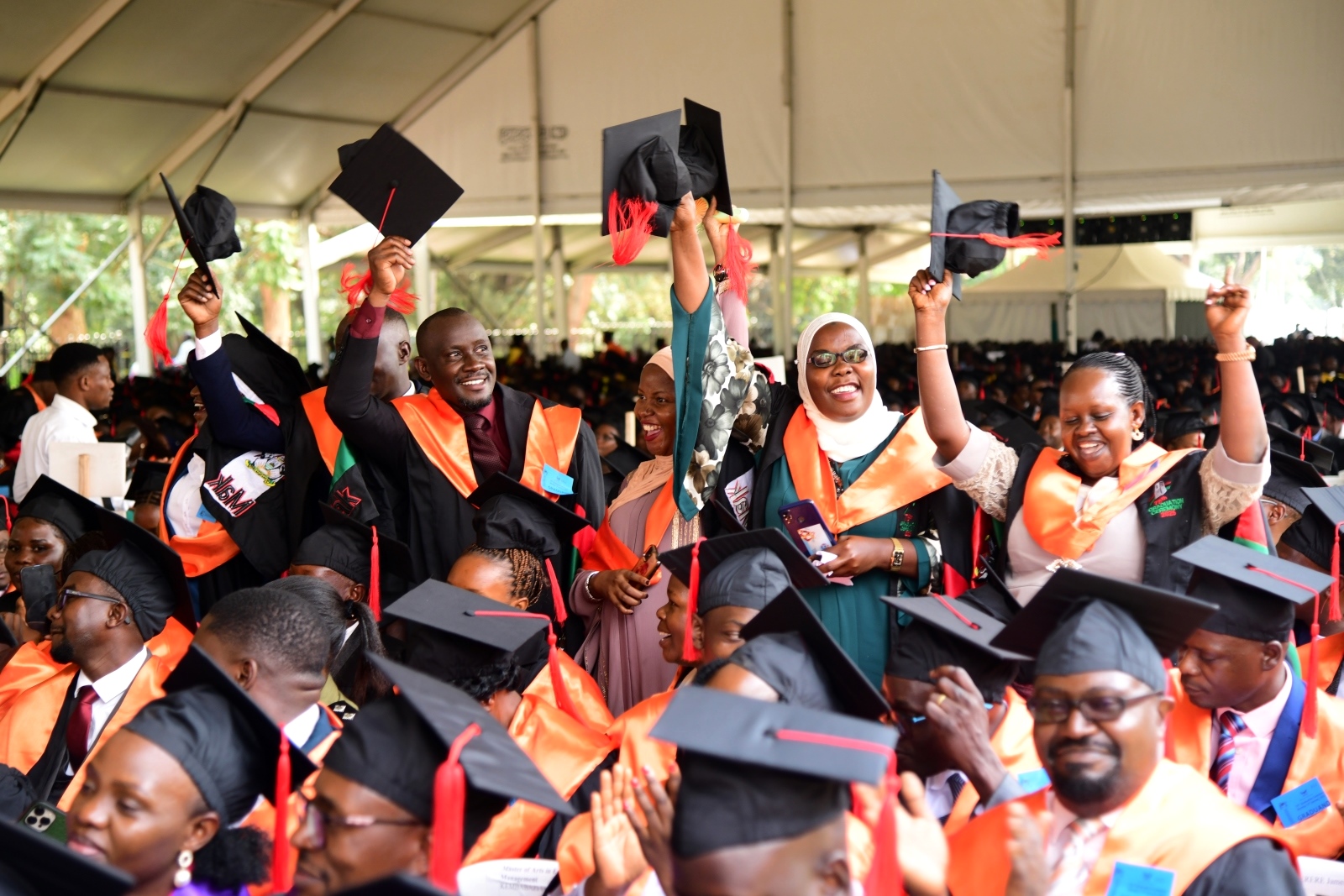
“At this stage, more resources and infrastructure are needed to support our innovations,” he added, calling for formal partnerships with the investment community to scale up these efforts.
Addressing the issue of unemployment, Dr. Kiyonga urged graduates to leverage their education to create opportunities for themselves and others. “What is critical is sustaining the thinking that you can indeed apply your knowledge to create work in areas with demand within the population,” he said.
He also encouraged graduates to work together to innovate and start businesses, stating, “Partner with some of your friends to form teams, come up with an idea, and you could turn that idea into an innovation, business enterprise or product.” He emphasized that graduates should not limit themselves to seeking employment, but should embrace entrepreneurship as a means of solving societal problems.
Dr. Kiyonga proposed expanding Makerere’s community outreach efforts, particularly in the agricultural sector. “I propose formalized relationships with some medium to large scale farmers across the country,” he said, suggesting that students in the agriculture department could benefit from hands-on internships with these farmers. In return, students would assist with extension services, boosting productivity in smaller farms and contributing to food security.
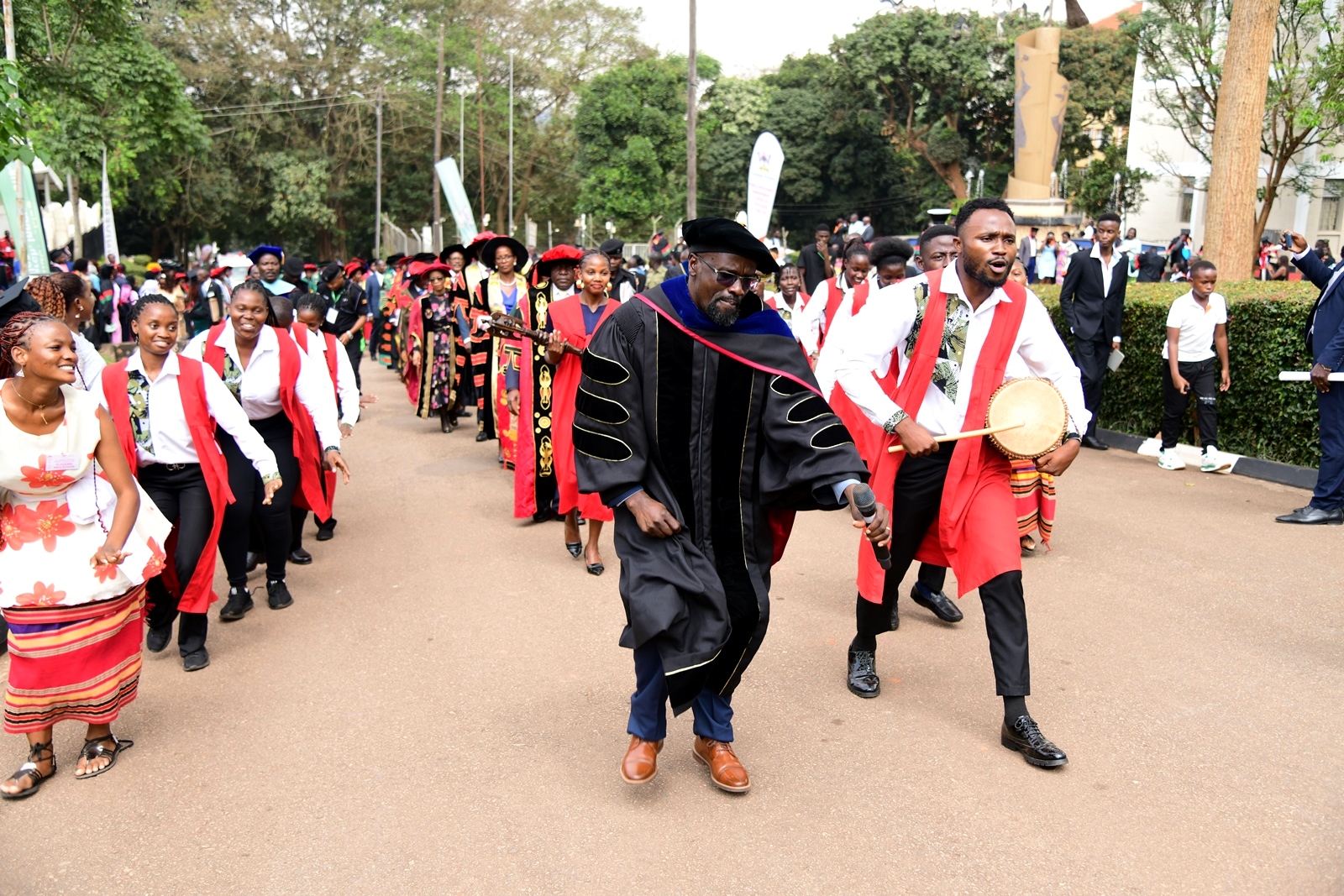
“There are also gaps in some of the training of Ugandans abroad,” Dr. Kiyonga added, noting that Makerere University could collaborate with foreign universities to provide practical training for Ugandan students, especially in fields such as human medicine.
In line with President Museveni’s directive, Dr. Kiyonga also highlighted the importance of incorporating political economy into all university courses. “It is critical that we deeply appreciate socio-economic forces that determine forward movement or lack of it,” he said, explaining that understanding these forces is essential for preparing graduates to lead effectively in a rapidly changing world.
Prof. Nawangwe Highlights Achievements and Growth
In his address, Vice Chancellor Prof. Nawangwe celebrated Makerere’s progress, particularly in its transformation into a research-led institution. He detailed various innovative projects across the university’s colleges, including the development of cutting-edge technologies, such as the AI Health Lab’s malaria diagnostic tools, and initiatives such as the Makerere University Innovation Pod (UniPod), which has incubated dozens of innovations.
“We are making steady progress on our strategic journey of a research-led university,” Prof. Nawangwe stated, revealing that Makerere has supported the commercialization of 15 projects, with a total of 157 projects now ready for integration into Uganda’s national economy.
Prof. Nawangwe also reflected on the institution’s ongoing infrastructure development, including the restoration of the iconic Main Administration Building and the opening of a new state-of-the-art Law School building. These developments, alongside initiatives such as the establishment of a Disability Support Centre, further underline Makerere’s commitment to improving both student and staff welfare.
Among the key statistics of the graduation ceremony, Prof. Nawangwe highlighted that 53% of the 13,658 graduands were female, and 491 graduated with first-class honors. He also spotlighted the achievements of specific colleges, including the College of Education’s initiatives to tackle youth unemployment through entrepreneurial training and the College of Veterinary Medicine’s efforts to develop vaccines and diagnostics for key diseases.
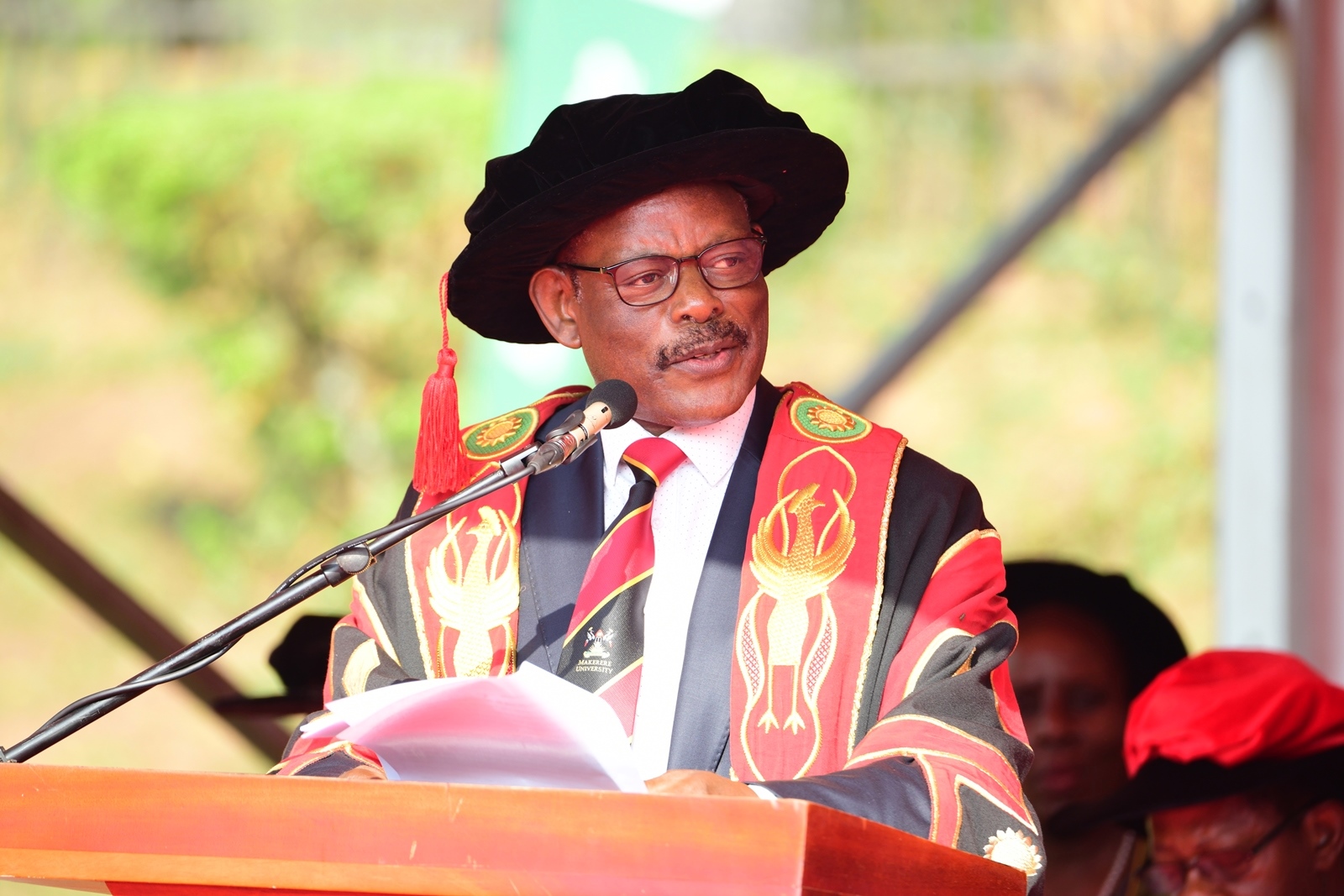
Further illustrating the university’s global reach, Prof. Nawangwe noted Makerere‘s collaboration with international partners such as Google and the European Commission, which has provided substantial funding for health and climate change-related projects. “The Government of Uganda provides Makerere University with a Research and Innovation Fund to support cutting-edge solutions,” he added.
In a powerful and inspiring commencement address, Professor LenkaBula Puleng, the Principal and Vice-Chancellor of the University of South Africa (UNISA), urged the graduates—especially women—to tap into their resilience, embrace their generational mission, and redefine their worth in shaping Africa’s future.
Reflecting on Makerere’s distinguished legacy, Professor LenkaBula praised the university as a beacon of academic excellence, whose contributions have been instrumental in Africa’s intellectual and social development. She highlighted its pivotal role as a cornerstone for both anti-colonial and post-colonial scholarship, underscoring the profound impact it has had on shaping the continent’s intellectual landscape.
“Makerere University, along with its sister institution-the University of South Africa, has been pivotal in the African struggle for freedom and unity,” said Professor LenkaBula. “It stands as a symbol of Africa’s intellectual resilience, a place where the seeds of transformation were planted during the colonial era and continue to grow today.”
Addressing the congregation gathered at Makerere’s historic Freedom Square, the Vice-Chancellor recognized the remarkable scholars who have shaped the African academic landscape through their work at Makerere, referencing figures such as Professor Dani Wadida Nabudere, Issa Shivji, Ngugi wa Thiong’o, Mahmood Mamdani, and many others. These scholars, she said, were instrumental in cultivating a new generation of thought leaders who continue to challenge the status quo and lead Africa toward progress.
Highlighting the role of African women in these transformative processes, Professor LenkaBula reminded graduates of resilient women who have played key roles in Africa’s history, such as Queen Amina of Nigeria, Yaa Asantewaa of Ghana, and Wangari Maathai of Kenya. These women, she noted, not only fought against colonial forces, but have continued to shape the post-colonial era through their activism, leadership, and vision.
Professor LenkaBula’s address focused on the significance of women in reclaiming their generational mission. She emphasized the importance of education as a tool for empowerment and transformation, especially for young women.
“Education is not an elite indulgence; it is a public good,” she said, citing the words of feminist scholar Amina Mama. She urged the graduates, particularly the women, to remember their history and their mission in the ongoing struggle for equality, justice, and peace.
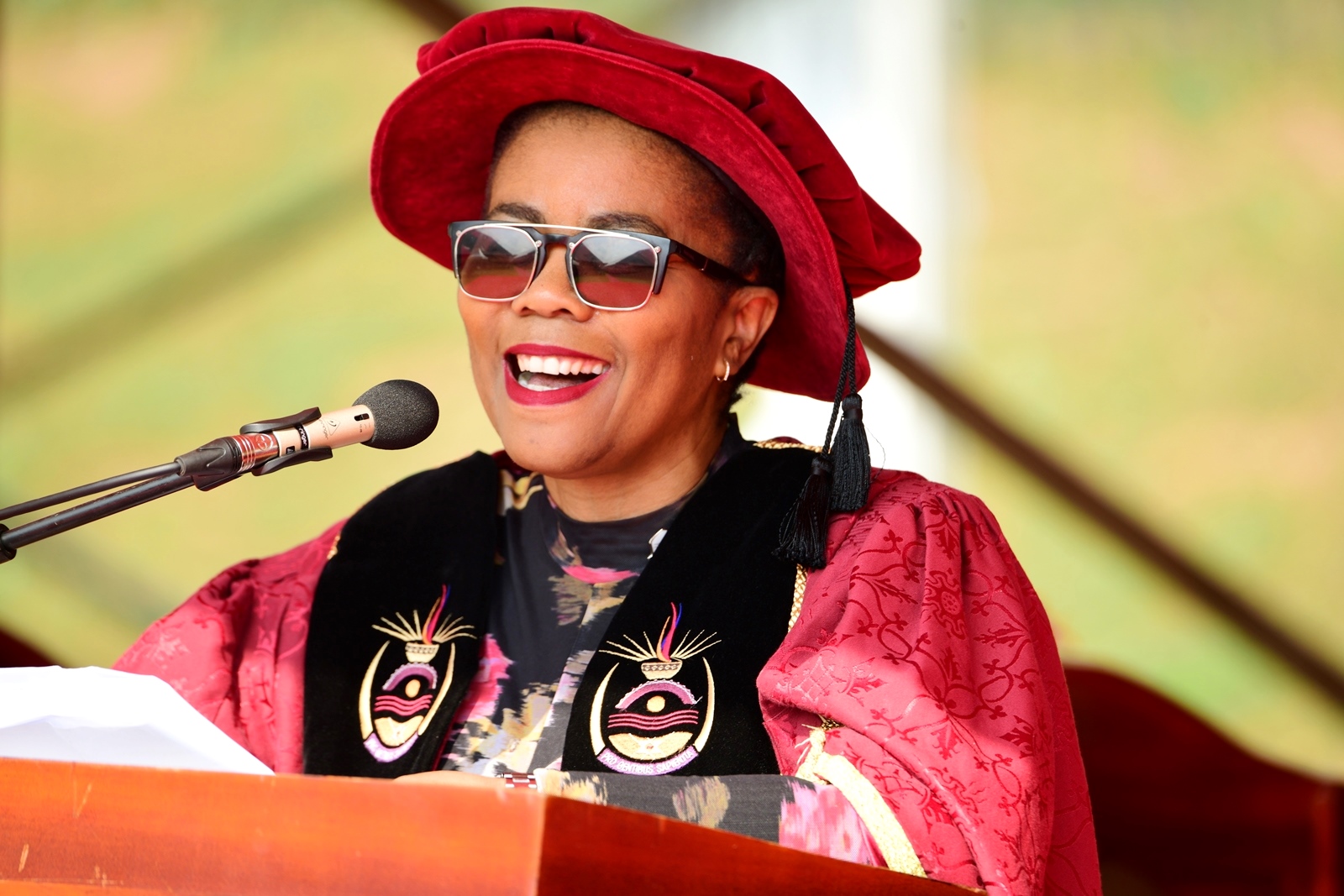
Her call to action was clear: graduates must not be prisoners of the past, but leaders who redefine the future. She challenged the new generation to take their place in fields such as medicine, agriculture, science, and technology, which are essential to Africa’s development. She encouraged them to forge a future of peace, sustainability, and inclusivity, underscoring the importance of creating a world that reflects their values and dreams.
Professor LenkaBula spoke to the youth about their responsibility to overcome the legacies of patriarchy and oppression, both within African societies and globally. She acknowledged that women, despite their significant contributions, continue to face disproportionate challenges, but she expressed confidence that this new generation of graduates—especially women—has the strength and determination to break these barriers.
“As graduates, you carry the mettle and the light to create more opportunities—for yourselves and others—to reclaim your mission and redefine your worth,” she said. “Africa is waiting for you, and you must rise to the occasion with the strength, courage, and vision to lead us into the future.”
In conclusion, Professor LenkaBula reminded the graduates that they are part of a legacy of change-makers and intellectual trailblazers, encouraging them to embrace their roles as the next generation of leaders who will drive the African Renaissance. She left them with an empowering message: “Reclaim your Generational Mission and Redefine your Worth as the new generation that Africa is waiting for!”
The 75th Graduation Ceremony at Makerere University marked not only the academic achievements of the graduates, but also a celebration of the university’s long-standing contribution to the African intellectual tradition and its continued role in shaping a better future for the continent. As the graduates left the Freedom Square, the call to action was clear: the future of Africa rests in their hands.
You may like
-


Makerere University School of Public Health Graduates First Cohort of Cost-Effectiveness Analysis Short Course
-
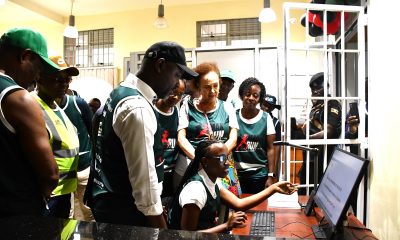

Students empowered to thrive through the Semester
-


Climate variability found to shape malaria trends in Yumbe District
-


Mak hosts First African Symposium on Natural Capital Accounting and Climate-Sensitive Macroeconomic Modelling
-


Uganda Martyrs Namugongo Students Turn Organic Waste into Soap in an Innovative School Project on Sustainable Waste Management
-


Strengthening Global Partnerships to Advance Research, Innovation, and Graduate Training: Makerere University Hosts Delegation from the University of Warwick
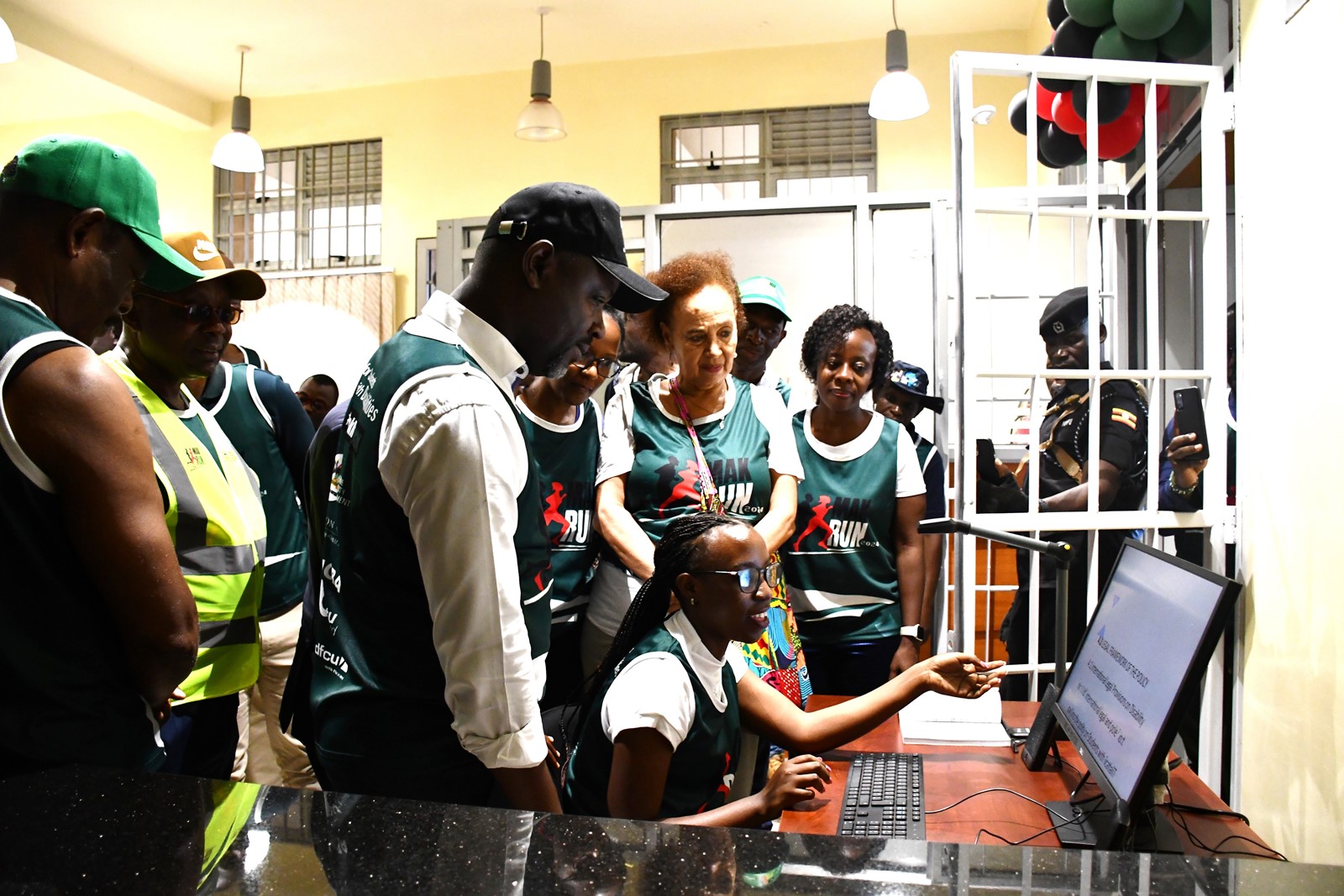
Students with disabilities at Makerere University have been requested to stop seeking for special attention and instead look for solutions and opportunities for personal growth.
This was during a mental wellness, inclusion and safeguarding session organized by the Dean of Students office and the Mastercard Foundation Scholars Program at Makerere University.
Addressing students on mental health and disability inclusion, Mr. Marvin Ggaliwango, a lecturer at the College of Computing and Information Sciences (CoCIS), noted that if the students stop complaining, they will become empowered to take charge of their own development, build resilience and engage confidently in both academic and social environments.
“Turn your lived experiences into tools for innovation. Stop complaining and start creating solutions for yourselves. You are the one living this life, and that gives you the authority to be an expert. When you develop a solution, it doesn’t just benefit you, it helps others too, by removing barriers,” Mr. Marvin Ggaliwango, said.
He encouraged students to see themselves not as victims of circumstance, but as active participants and co-creators of the inclusive environment they wish to experience.
“Learn how to communicate effectively and humbly. If you have a problem, express yourself clearly. Do not isolate yourself or feel resentful. You are not defined by disability, you may face disadvantages, but you still have ability,” he encouraged.
Throughout the session, students listened attentively as he emphasized the importance of self-awareness and personal responsibility, urging them to understand their strengths, acknowledge their limitations and take deliberate steps toward personal growth while contributing positively to the University community.
“We must enhance and ensure that our mental health is number one. Always choose yourself first. Choose what makes you happy and protect your peace. If you are at peace with yourself, your academics will improve. There is a strong link between mental wellness and academic success,” Mr. Ggaliwango, noted.
In his speech, Mr. Musa Mwambu, the Disability Inclusion Advisor at Light for the World Uganda, called upon the students with disabilities to enhance and ensure that their mental health is prioritized.
“As students living with disabilities, sometimes you over expect, because you have a disability you should be given, listened to and when people do not listen to you, you attribute it to your disability, get it from me, even those without disabilities are not listened too. Things are not happening to you because of your disability it is because of the world we live in. Everything that happens to you can happen to others,” Mr Mwambu, noted.
“Have fun with your life. Make yourself happy and be smart. Present yourself in public confidently wherever you go. The way you carry yourself can improve your mental health and how others perceive you,” Mr. Mwambu said.
He reminded the students that gaining admission to Makerere is itself a milestone.
“There are many people without disabilities who have never stepped at Makerere University. Find something that empowers you and hold on to it. You may have a physical impairment, but if you are brilliant in class, you can lead discussions and inspire others,” he added.

During the session, Dr. Rodney Rugyema, the Acting Principal Warden, welcomed the students back from the long holiday. He assured them that the University is committed to their safety and well-being while on campus.
Dr. Rugyema emphasized that the University has systems in place to protect students, both physically and psychologically and encouraged them to report any concerns promptly.
“When you are at the University, you are not on your own, we are always here for you. For us to engage you on mental wellness and inclusion, we want you to be in the right state of mind, whole and complete,” Dr Rugyema, said.
He added: “We are here to empower you and we are calling upon you not be a risk for yourself and always be able to detect risks that are likely to affect your mental health and works towards avoiding them and reporting them to ensure that the University manages them before they escalate into real harm whose impact is more serious than you can think,”
During the session, Ms. Diane Nabikolo Osiru highlighted the University’s broader commitment to safeguarding.
Safeguarding at Makerere University refers to measures put in place to promote safety and wellness of all students, staffs and other stakeholders.
“At Makerere University, safety is not a luxury for few. but it is a right for every student. As the semesters begins, we are urging you to learn how to identify signs of harm or abuses and report them to the appropriate safeguarding contact points,” Ms Nabikolo, said.
For support in case of any harm or abuse, International and Refugee Students, can access support through the Advancement and International Office, while Students with Disabilities, can utilize the Disability Support Center. Those with personal and emotional challenges, can visit the Counselling and Guidance Centre.
In his speech, Dr Joab Agaba, a Lecturer in the College of Computing and Information Sciences, guided students how to report risks and incidences to the MakSafeSpace, the e-reporting platform complimenting the other University traditional reporting channels.
Mr. Henry Nsubuga, the Manager of the Counselling and Guidance Center, shared practical strategies for coping with stress effectively including time management, setting realistic goals, seeking support from peers or counsellors.
Students speak out
Shanitah Nahamya, 2nd year student of the Bachelor of Adult and Community Education
“I have learned how to respectfully and appropriately engage with students with disabilities. In the past, I often felt pity when I encountered them, but now I understand that what they need is not pity, it is respect, support, and equal opportunity.”
Guo Dorothy Geri, 1st year student of the Bachelor of Commerce
“I have learnt how to use inclusive language. Before offering help to a student with a disability, I will first ask them, because not all the time do they need our help. You might think someone wants to be helped to cross the road, yet they are waiting for someone.”
Valentines Doris Aduka, 1st Year student of the Bachelor of Biomedical Science
“I have been calling students with disabilities special names, thinking it was kind. But I have learned that they do not want to be treated differently or labeled in a special way. What they value most is being treated like everyone else, with respect, dignity, and fairness.”
General
Strengthening Global Partnerships to Advance Research, Innovation, and Graduate Training: Makerere University Hosts Delegation from the University of Warwick
Published
4 days agoon
February 19, 2026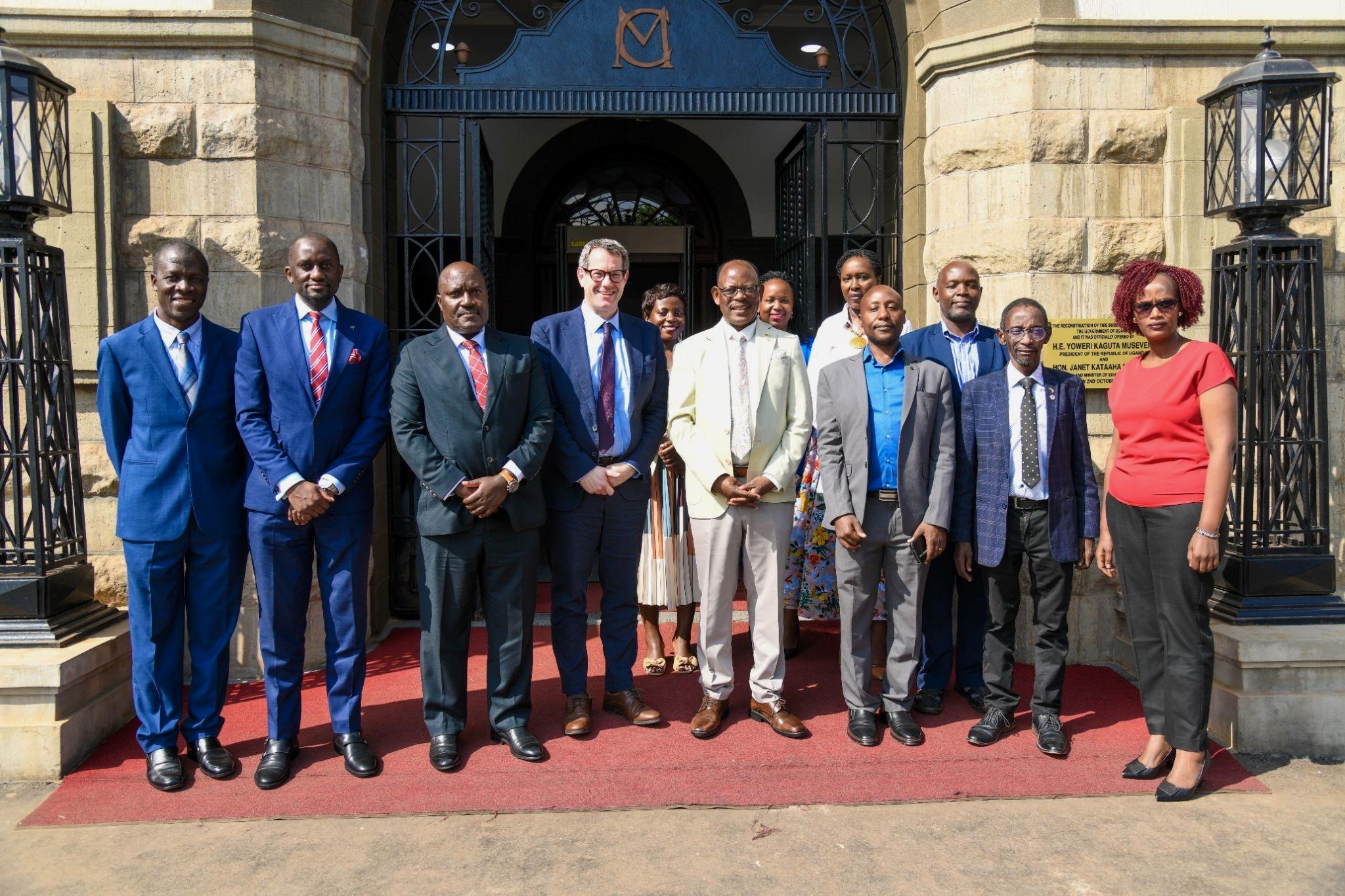
Makerere University continues to deepen its global engagement agenda through strategic partnerships that enhance research, innovation, and graduate training. On Friday, 13th February, 2025, during a recent engagement with a delegation from the University of Warwick (UK), university leaders, researchers, and administrators explored potential collaborations to address pressing development challenges and strengthen institutional capacity.
Expanding Collaboration in Research and Innovation
Welcoming the delegation, Prof. Fred Masagazi-Masaazi, Chairperson of the Makerere University Research and Innovations Fund (Mak-RIF) Grants Management Committee, emphasized the growing dialogue between Makerere University and the University of Warwick. He noted that ongoing discussions are focused on resource mobilization to support research and innovation, as well as building sustainable academic exchanges for both staff and students.
Dr. Roy Mayega, Mak-RIF Coordinator, together with Mrs. Phoebe Lutaaya Kamya, Deputy Coordinator, and members of the Mak-RIF team, highlighted the Fund’s role in catalyzing collaborative research and strengthening partnerships that translate research into societal impact.
Mr. Simon Kizito, Deputy University Secretary, outlined key areas identified for collaboration, including joint research and innovation initiatives, benchmarking visits across disciplines such as law, science, and ICT, and student exchanges designed to strengthen applied research skills. He also pointed to opportunities for training Makerere staff in specialized areas such as tropical diseases and innovation ecosystems, drawing lessons from Warwick’s strong linkages with industry partners located within its campus.
Makerere’s Strategic Priorities and Global Role
In his remarks, the Vice Chancellor underscored the longstanding relationship between Makerere University and the University of Warwick, dating back to the early 1980s, initially through staff training and more recently through collaborative research.
He highlighted Makerere’s historic contribution to leadership development across Africa and beyond, and the University’s continued growth following faculty rebuilding efforts in the 1980s, which have strengthened its research capacity. Today, Makerere has over 1,300 academic staff, more than 1,000 of whom hold PhDs, positioning the institution to play a leading role in knowledge production.
The Vice Chancellor also outlined major thematic areas where partnerships are critical:
- Climate change and food security: Researchers at the College of Agricultural and Environmental Sciences (CAES) are developing drought-resistant and high-yield seed varieties to address changing weather patterns and food insecurity.
- Public health and infectious diseases: Uganda faces frequent outbreaks of diseases such as Ebola and Marburg, and Makerere has built strong capacity in outbreak response and tropical medicine. The University’s medical school and the Infectious Diseases Institute (IDI) continue to play a pivotal role in research and treatment.
- Peace and conflict studies: Through initiatives such as the Rotary Peace Centre, Makerere contributes to training global leaders in conflict resolution.
- Climate-sensitive macroeconomic modelling: Makerere recently hosted a conference in collaboration with the Ministry of Finance, Planning and Economic Development to advocate for climate-responsive macroeconomic modelling and to plan for the establishment of a Centre of Excellence in this field.
- Innovation and technology: The University’s innovation ecosystem has produced notable outputs, including Africa’s first electric vehicle and ongoing work to expand incubation facilities to enable students to graduate with viable enterprises.
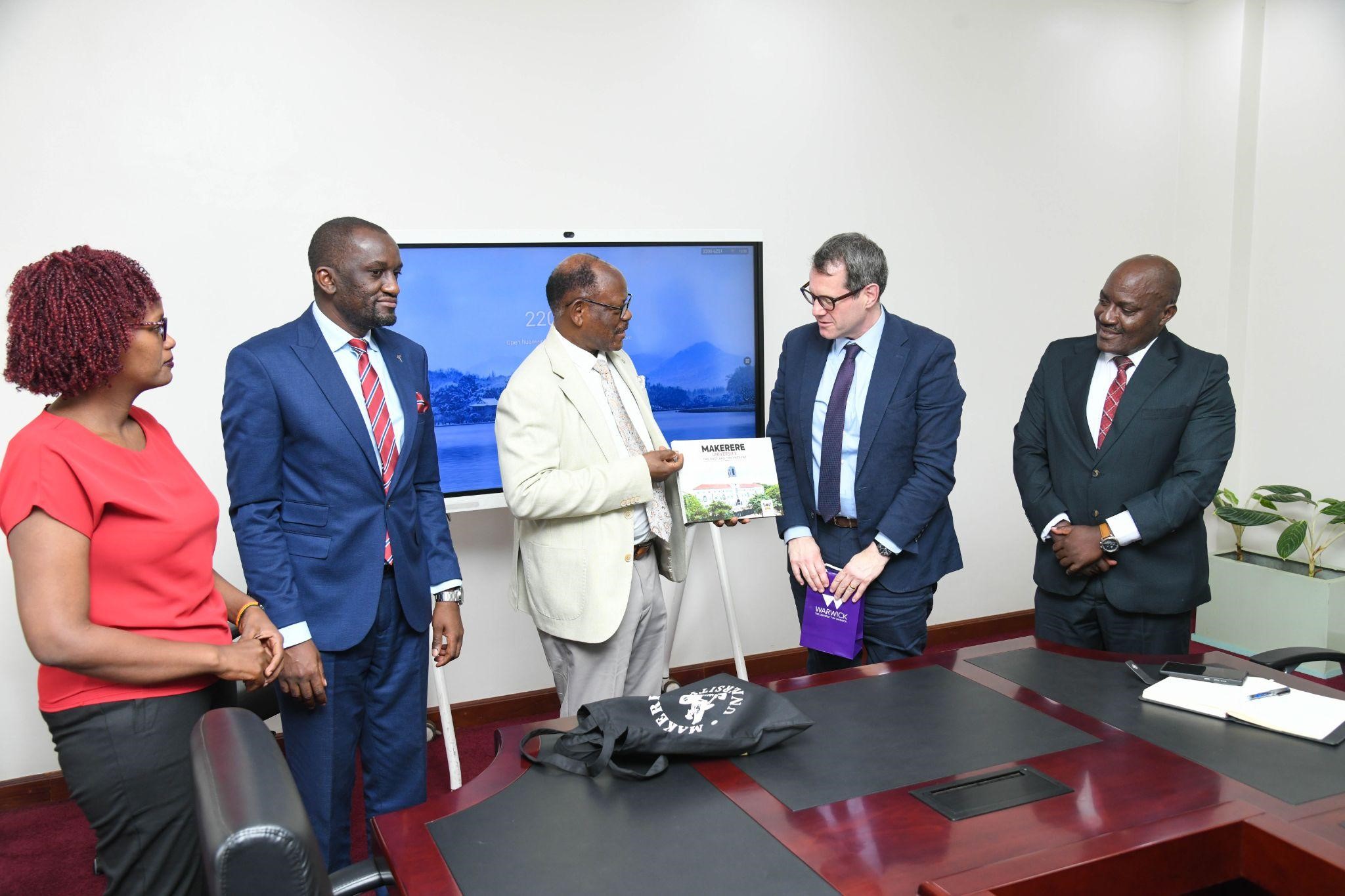
The Vice Chancellor emphasized that addressing youth unemployment remains a central priority, noting that innovation, entrepreneurship, and graduate training are essential to building stable societies.
He further stressed the importance of expanding graduate education. Africa currently produces a small proportion of global research output, and increasing PhD and Master’s training supported by international partnerships remains critical to accelerating knowledge production and development outcomes.
Internationalization and Shared Learning
Speaking on behalf of the University of Warwick, Professor Daniel Branch, Deputy Vice Chancellor, reflected on Warwick’s own institutional journey, noting that its growth has been driven by a strong focus on internationalization, innovation, and research. He expressed Warwick’s commitment to building productive partnerships with African universities, including Makerere, to advance joint research, training, and innovation.
Professor Branch also highlighted the importance of university-industry linkages, citing examples such as collaborations with major manufacturing firms that provide practical training opportunities and inform curriculum development.
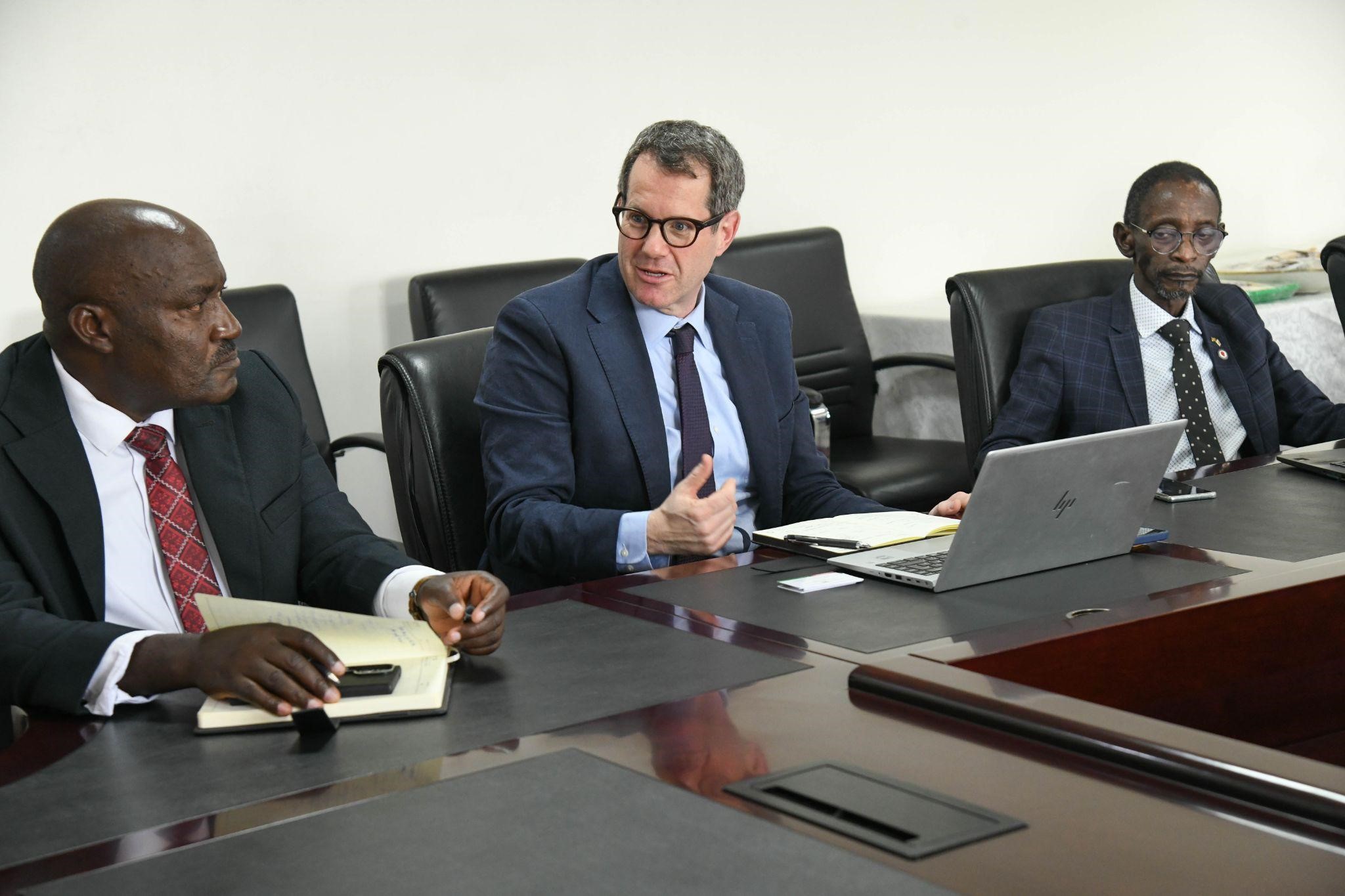
Showcasing Research and Innovation at CEDAT
A second session of the engagement was held at the College of Engineering, Design, Art and Technology (CEDAT), where academic leaders and researchers presented ongoing work across multiple disciplines.
Presentations included:
- Development of a solar water pump through reverse engineering (Dr. Edmund Tumusiime)
- Crane Cloud, a locally developed cloud-computing platform (team from the College of Computing and Information Sciences)
- Profiling gaseous emissions associated with burnt bricks (Dr. Nathan)
- Integration of centralized grid and decentralized renewable off-grid systems: a techno-economic analysis (Dr. Abubaker Waswa)
- Innovation and digitalization pathways for affordable housing in Sub-Saharan Africa (Prof. Stephen Mukiibi)
The session was attended by CEDAT leadership, including the Principal, Prof. Moses Musinguzi, as well as deans and heads of department from engineering, built environment, and industrial and fine arts. The day’s activities were concluded with a tour of Makerere University’s Innovation Hub.
The engagement reaffirmed Makerere University’s commitment to building strong, mutually beneficial partnerships that accelerate research, strengthen graduate training, and drive innovation. As global challenges such as climate change, public health threats, and youth unemployment intensify, collaboration among universities remains essential to developing scalable, evidence-based solutions.
Through partnerships such as the one Makerere University and the University of Warwick hope to activate through a Memorandum of Understanding in the near future, Makerere continues to position itself as a leading research-intensive university dedicated to transforming society through knowledge, innovation, and global cooperation.
Caroline Kainomugisha is the Communications Officer, Advancement Office, Makerere University.
General
Mastercard Foundation Scholars embrace and honour their rich cultural diversity
Published
4 days agoon
February 18, 2026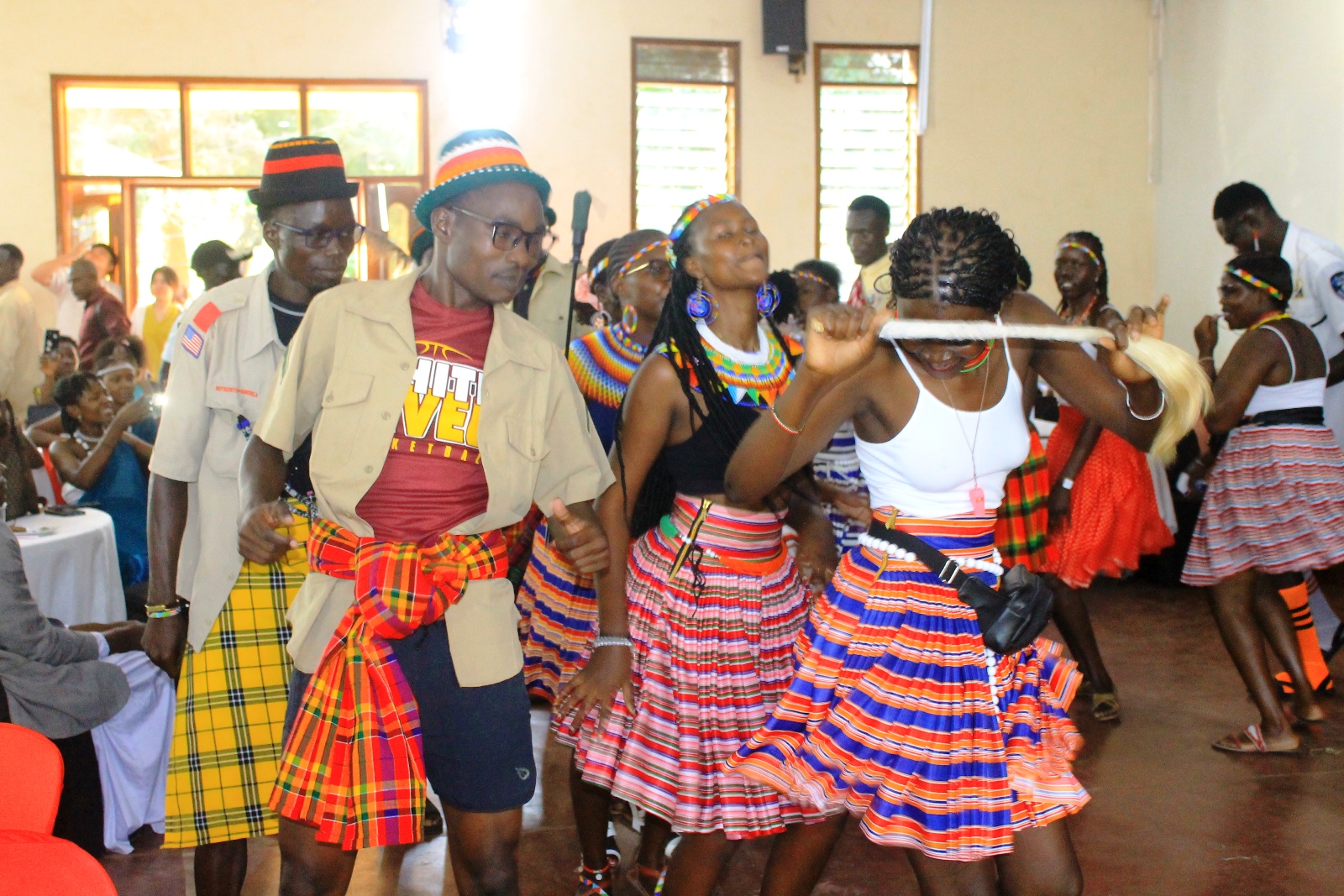
On the evening of Friday, 13th February 2026, the Scholars of Mastercard Foundation embraced the new semester with enthusiasm and celebration, showcasing their rich cultural diversity at the annual cultural dinner. This event not only fostered a sense of community but also highlighted the importance of cultural exchange and understanding among the scholars. The purpose of the cultural dinner is to foster unity in diversity within the Scholars community and to enable young people to appreciate and respect each other’s cultural differences.
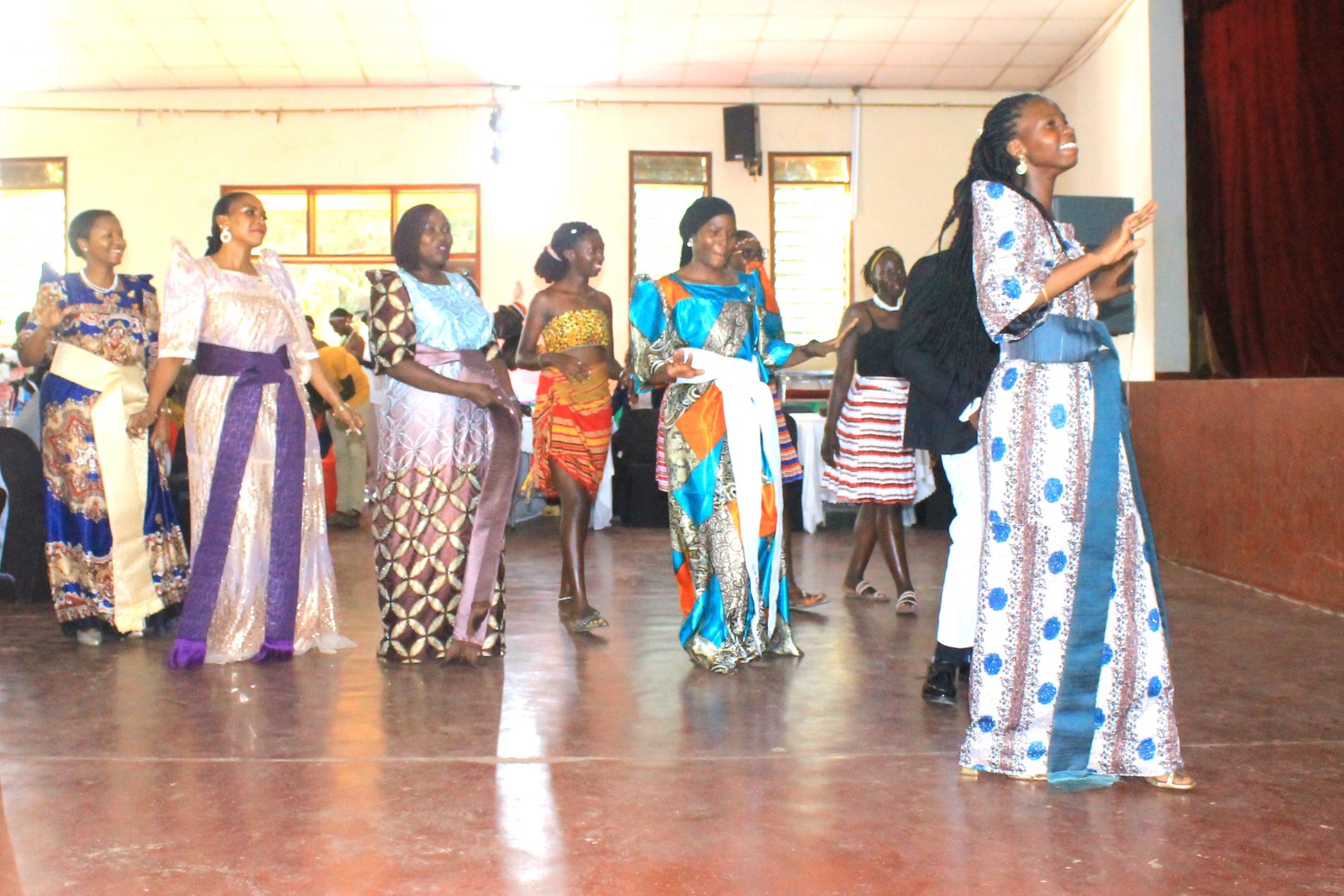
The Mastercard Foundation Scholars community at Makerere University is a vibrant tapestry of countries, cultures, and backgrounds. In recognition of this richness, the Program team has proposed organising an annual cultural dinner to kick off each new semester. This event aims to achieve several important objectives:
- Promote mutual understanding and cross-cultural appreciation among Scholars.
- Celebrate and highlight the unique cultural identities within our community.
- Encourage confidence and creativity through a dynamic talent showcase.
- Foster a sense of unity and excitement as we embark on the new academic semester together.
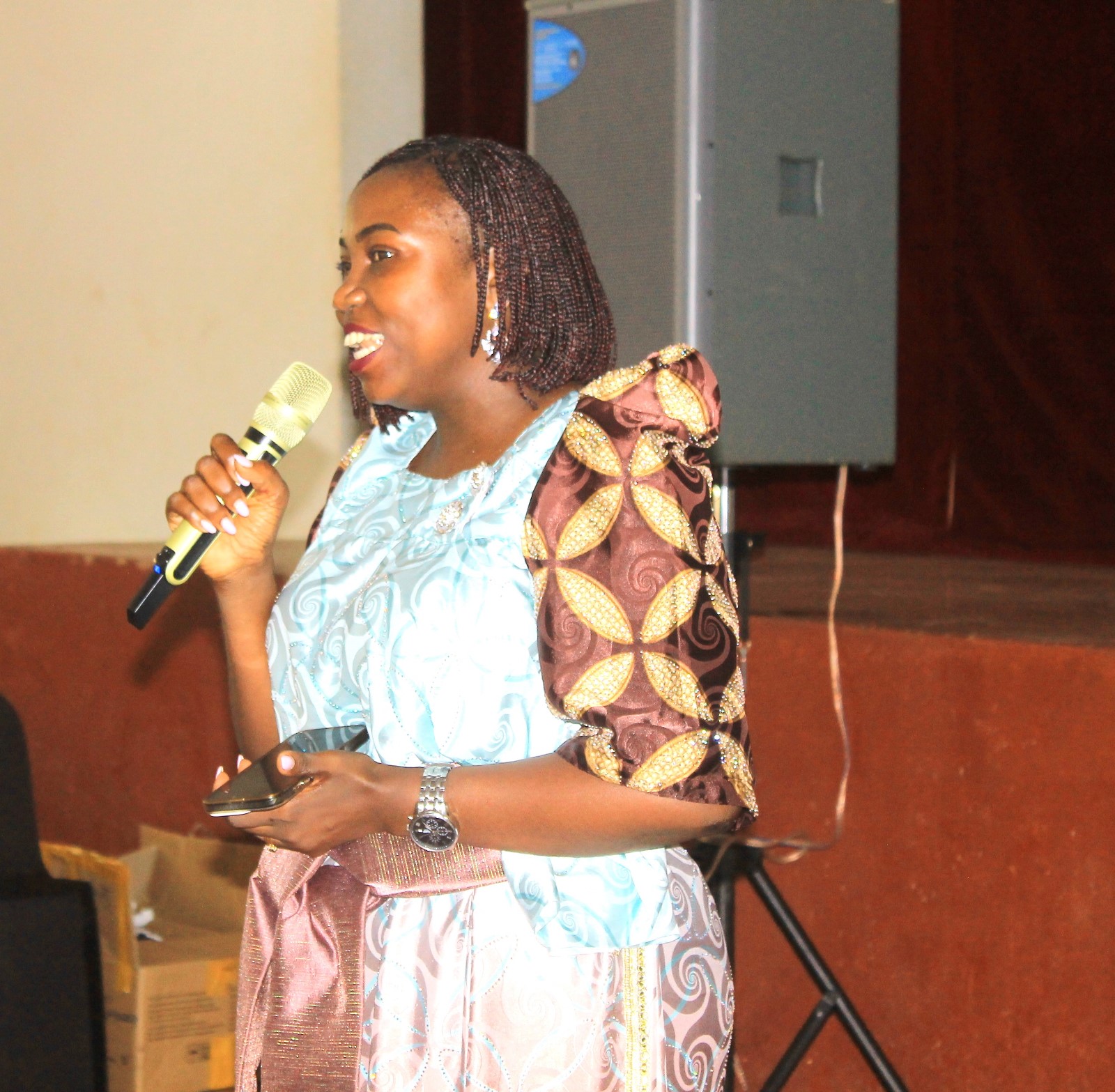
During the event, the Scholars proudly showcased their diverse cultures through a vibrant display of traditional attire, engaging dances, delectable dishes, and meaningful expressions in their native languages. The event showcased a rich tapestry of cultures, including the Baganda from Central Uganda; the Banyankore, Bakiga, Batooro, and Banyoro from Western Uganda; the Acholi from the North; the Karamojong from the Northeast; and the Basoga and Bagisu from the Eastern region, among many other indigenous tribes in Uganda. Additionally, attendees enjoyed cultural performances from South Sudan, Rwanda, and the Democratic Republic of Congo, celebrating the unique heritage of each community.
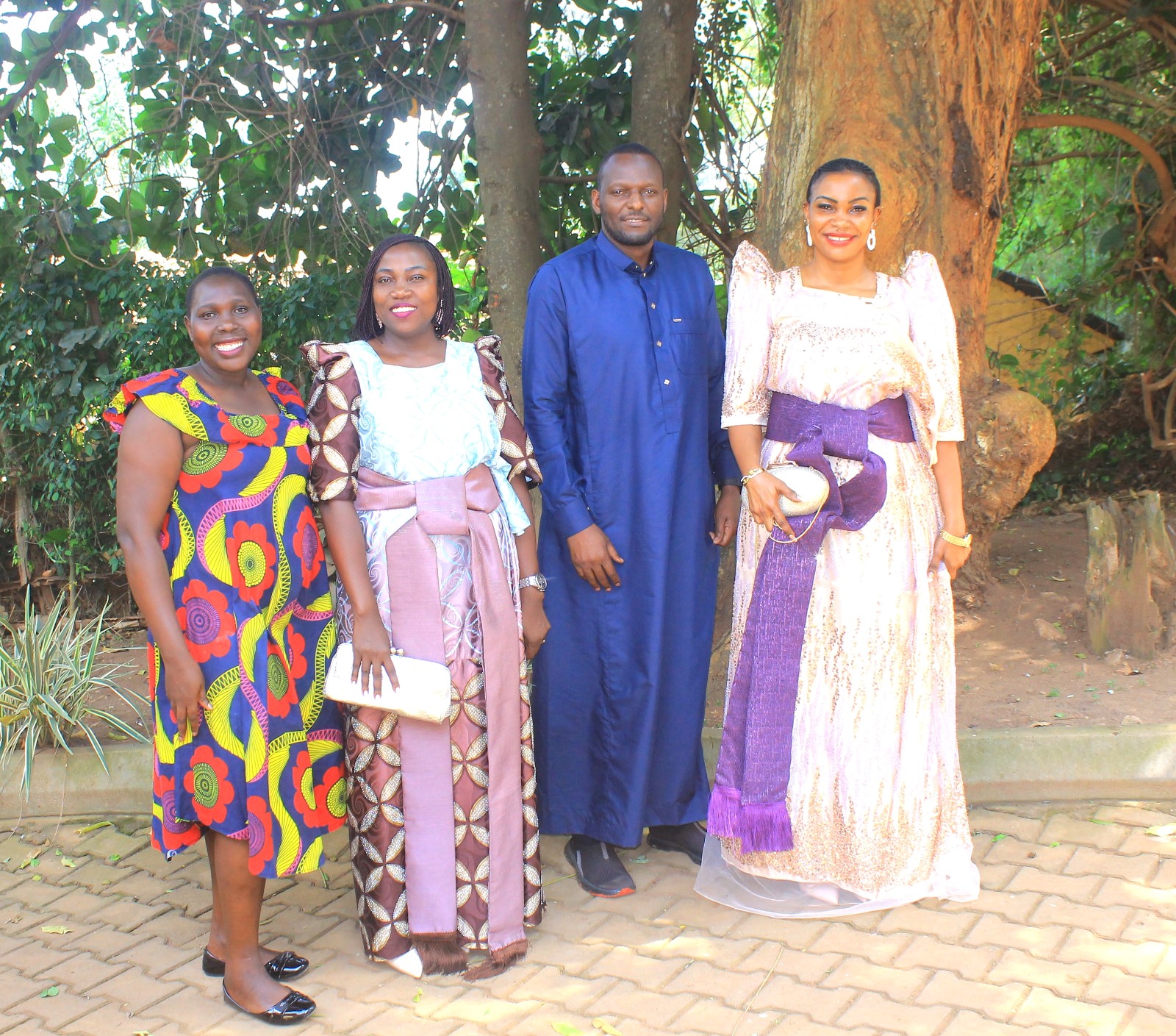
The event also featured a vibrant showcase of cultural attire, accompanied by traditional songs and dances. Attendees enjoyed cultural dress modelling, engaging performances, art displays, and interactive quizzes, culminating in exciting prizes awarded to outstanding performers. This diverse array of activities contributed to a rich celebration of creativity and cultural exchange.
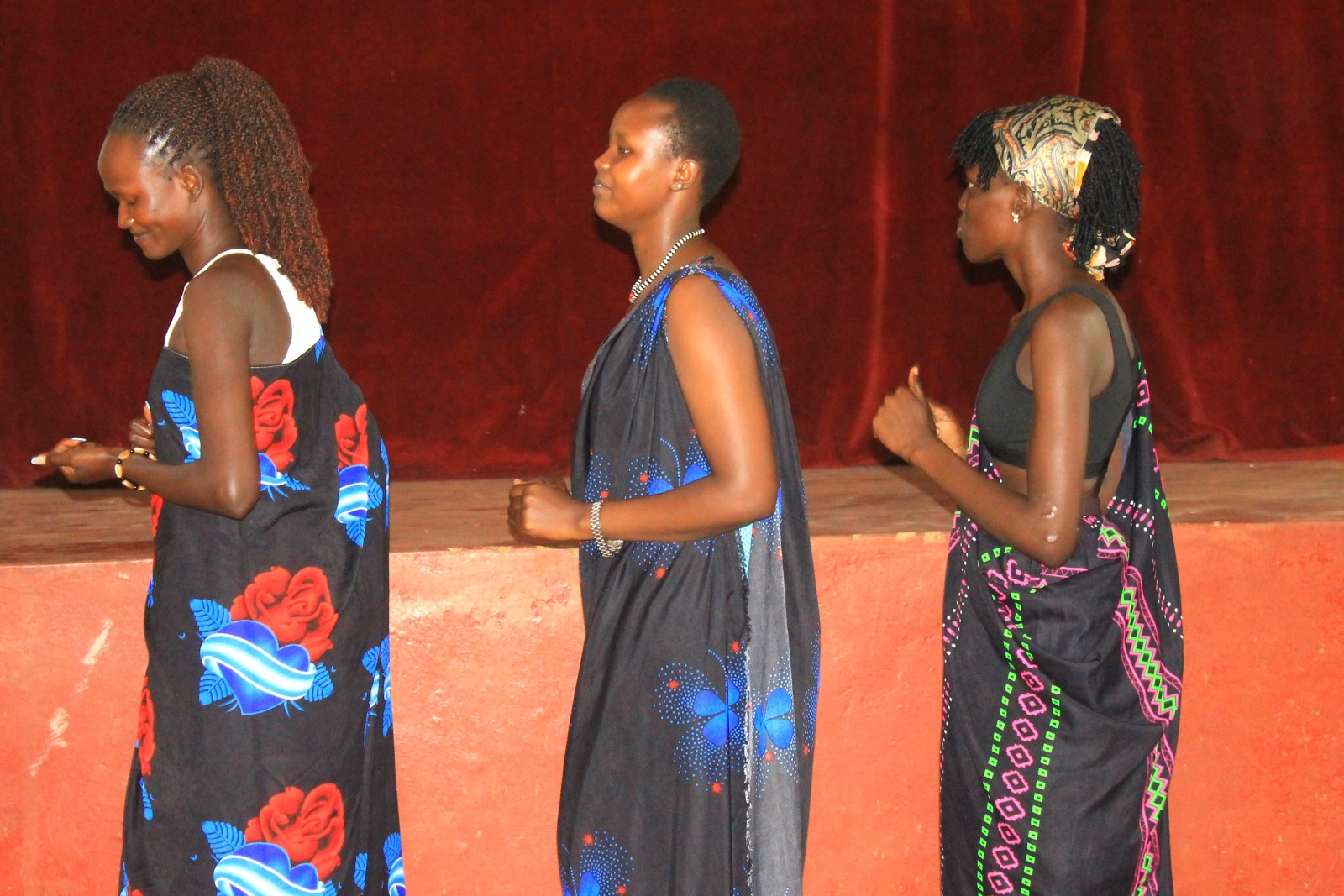
The Mastercard Foundation Scholars Program at Makerere University is committed to fostering holistic development, community building, and leadership among Scholars. At the start of each semester, the Program Team hosts a cultural dinner to reconnect the Scholars community, share key Program updates, and create an inclusive space to strengthen belonging and engagement. The cultural dinner is a critical platform for raising awareness of the need to appreciate and respect cultural diversity.
Bernard Buteera is the Principal Communications Officer for the Mastercard Foundation Scholars Program at Makerere University.
More Photos from the Dinner
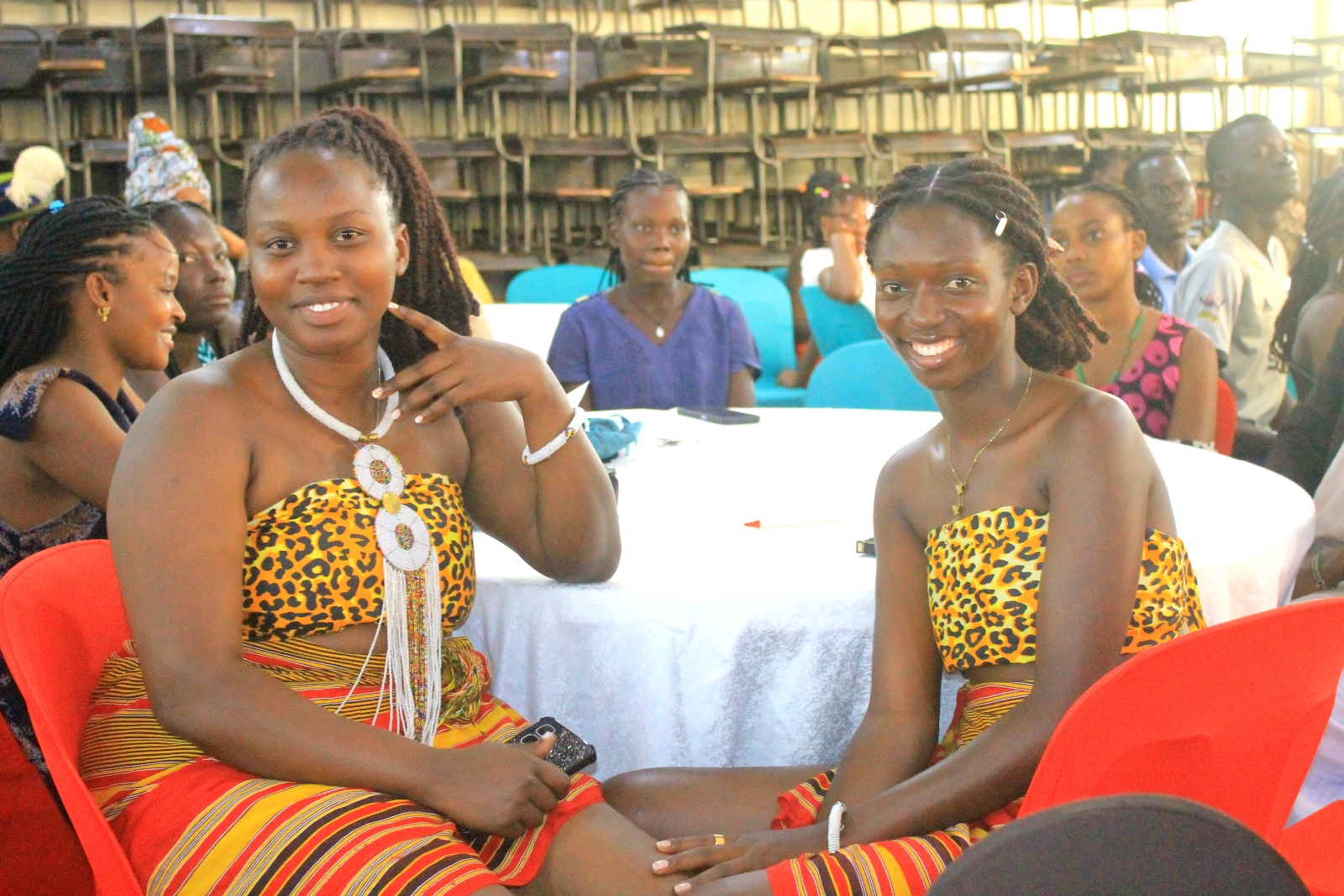
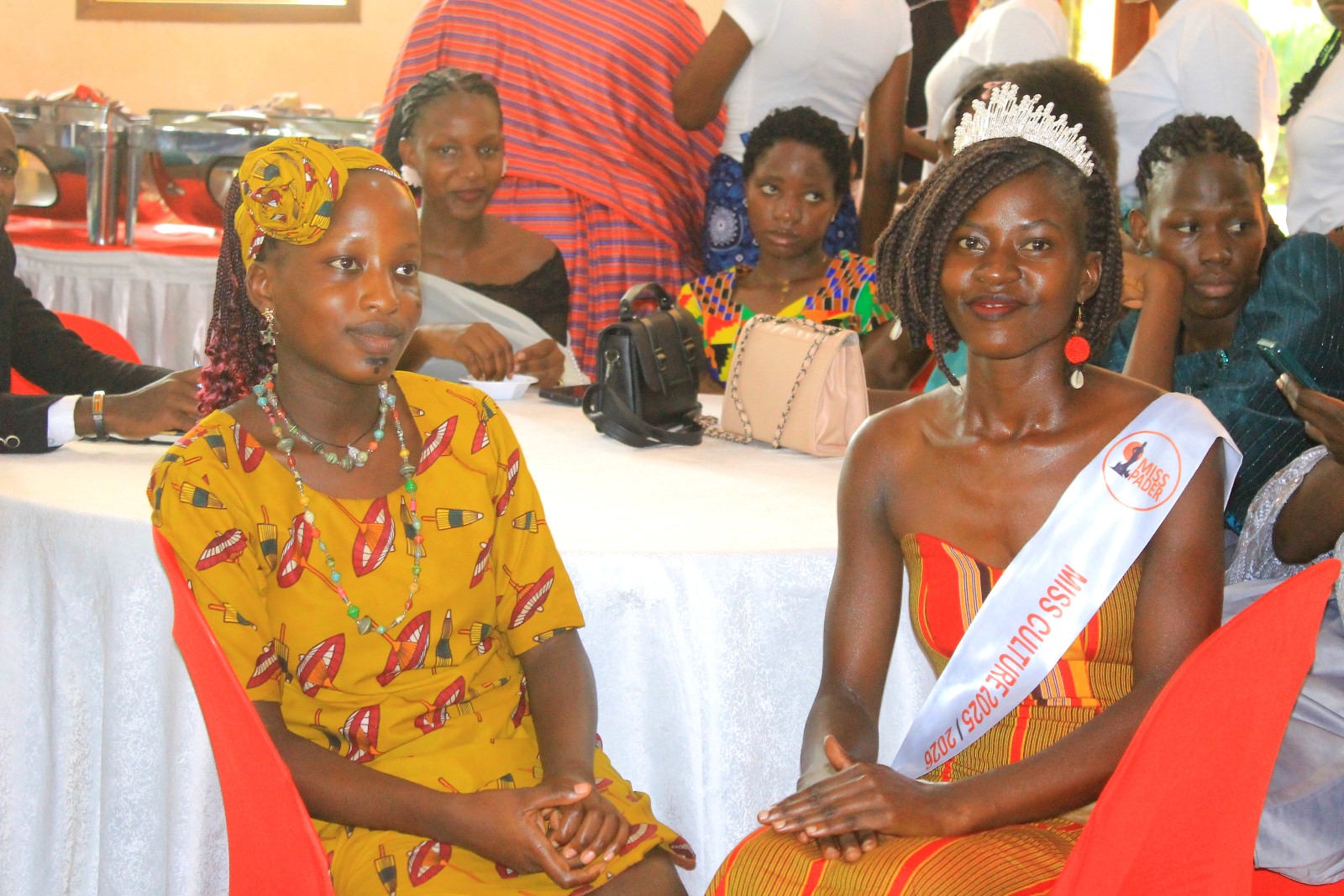
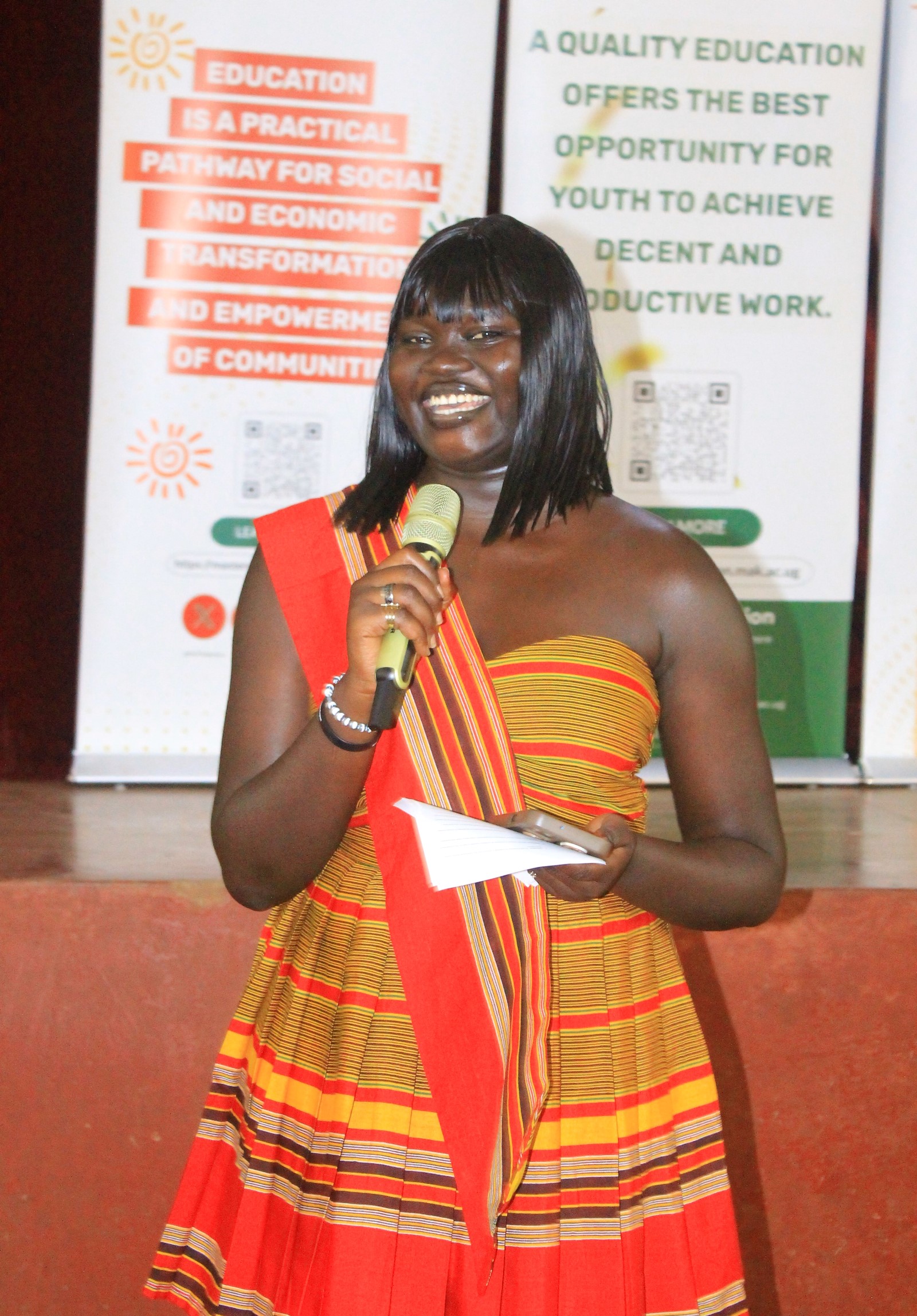
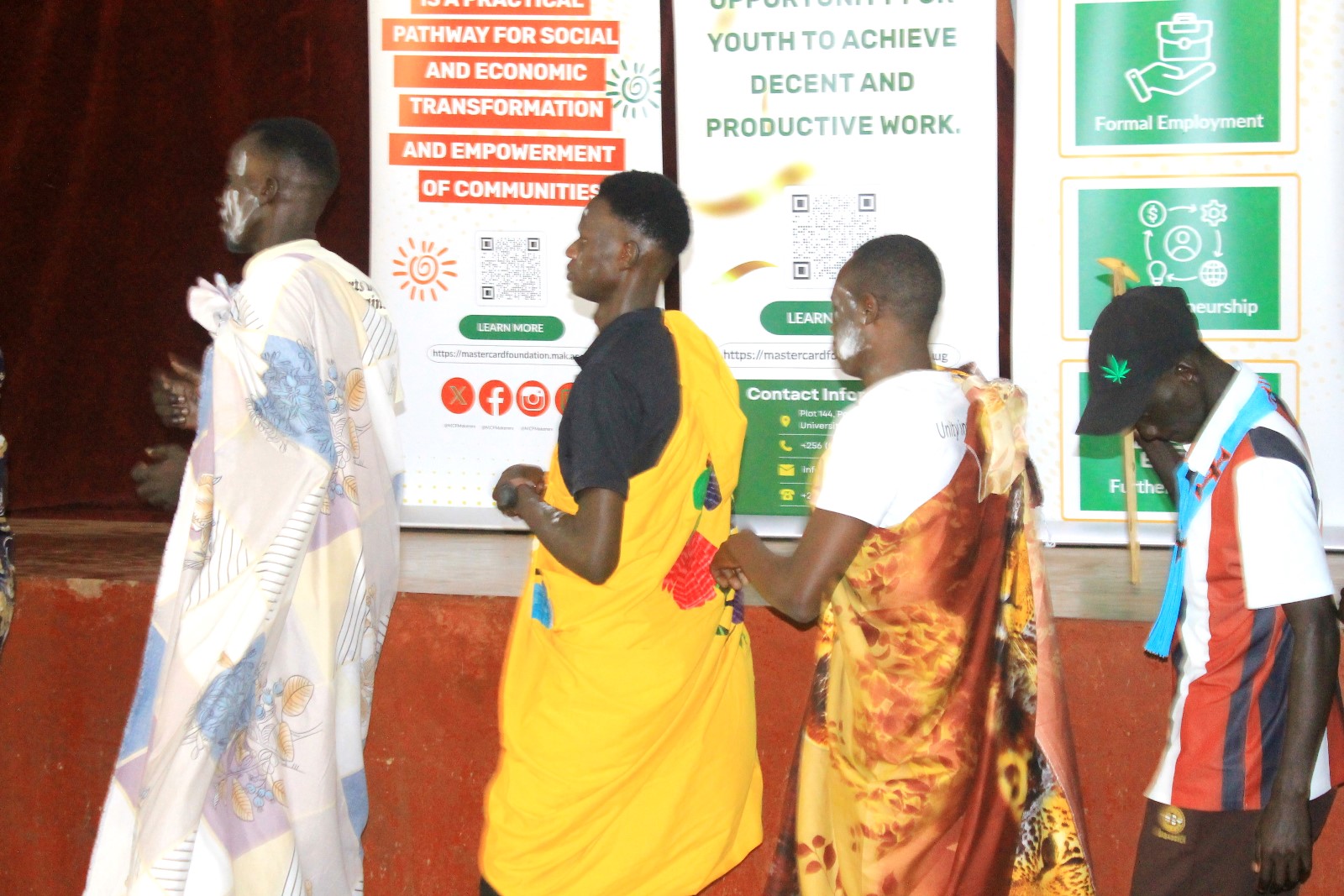
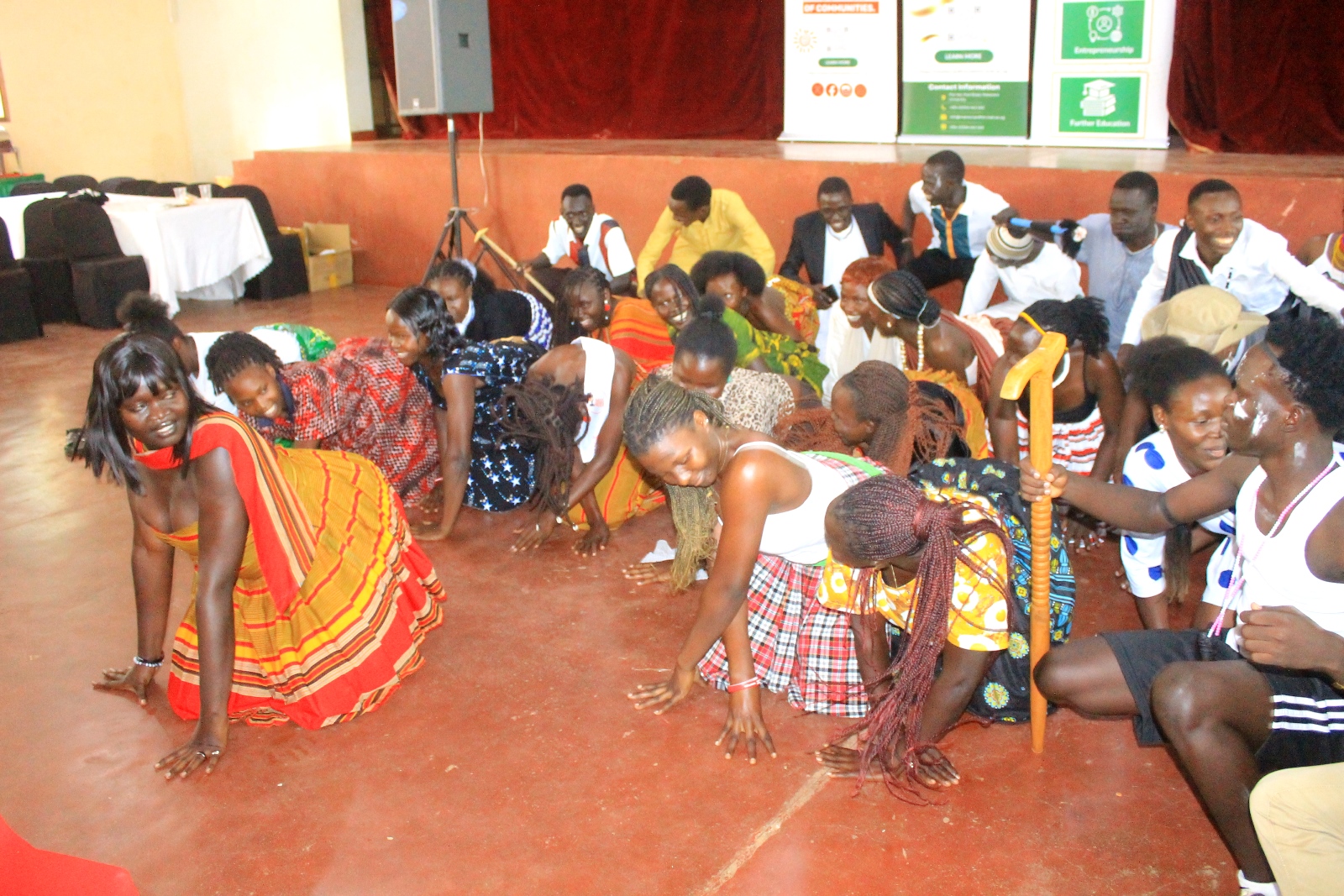
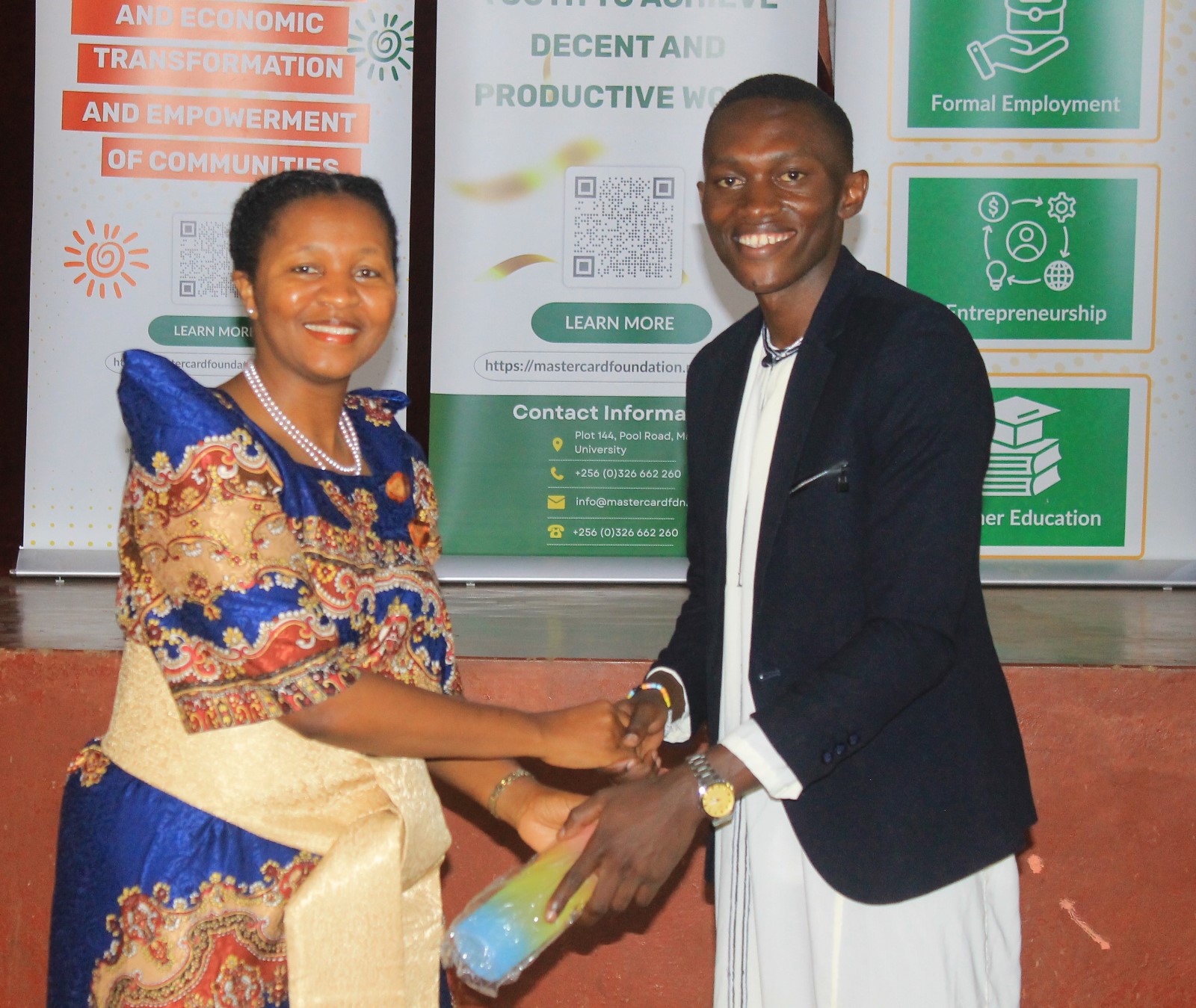
Trending
-

 General2 weeks ago
General2 weeks agoAptitude Exam (Paper 1) Results for the Mature Age Entry Scheme 2026/2027
-

 Health4 days ago
Health4 days agoUganda has until 2030 to end Open Defecation as Ntaro’s PhD Examines Kabale’s Progress
-

 Health2 weeks ago
Health2 weeks agoHow Jimmy Osuret Turned Childhood Trauma into Evidence for Safer School Crossings
-

 General2 weeks ago
General2 weeks agoFor Youth by Youth – Call for Second Cohort Applications
-

 General4 days ago
General4 days agoMastercard Foundation Scholars embrace and honour their rich cultural diversity
